Jun 05, 2025
Author:Amanda Lyu
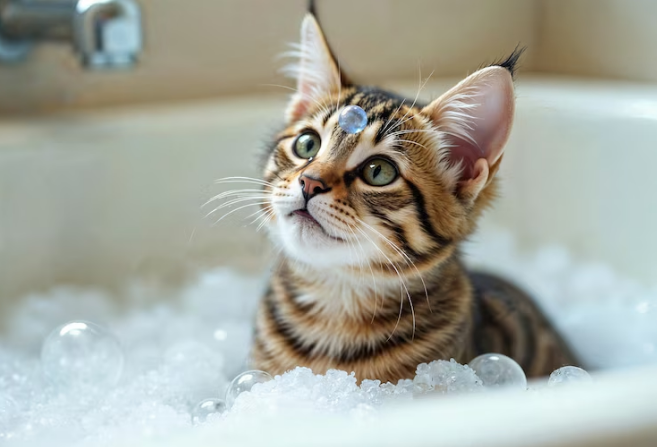
Dawn dish soap is in nearly every kitchen. It cuts through grease, tackles oil spills, and gets the job done. But can it clean a cat?
Here’s the problem: cats aren’t dishes. Their skin is delicate. Their grooming habits are constant. And using the wrong product, even once, can throw their system off. Still, some people swear by Dawn for fleas, grime, or emergency cleanups. So what’s the truth?
You’re in the right place if you’re standing over a muddy cat, holding a bottle of dish soap, and wondering if it’s safe—or about to make things worse.
In this article, we’ll break it all down:
● What Dawn dish soap is and how it works
● The active ingredients and how they react with the cat's skin
● Whether Dawn is safe for cats in any situation
● When it's OK to use it—and when it’s a hard no
● Better, safer alternatives for regular cat cleaning
This isn’t guesswork. You’ll walk away knowing exactly what to do—and what not to do—next time your cat needs a scrub.
Dawn isn’t your average sink-side cleaner. It’s a powerful surfactant-based soap designed to break down grease, oil, and organic residue fast. Originally formulated for dishwashing, it's gained attention for its use in animal cleanups—but that doesn’t make it pet-friendly by default.
Here’s what makes it work:
Surfactants do most of the heavy lifting. They’re tiny molecules that cut down on the surface tension between water and oils. This lets soap grab onto grime and lift it away. Dawn specifically uses something called anionic surfactants, which are particularly good at locking onto dirt, oil, and old skin cells, helping wash them all off easily.
Add to that:
● Solvents, like alcohol-based agents, which help dissolve oily residues
● Preservatives that keep bacteria and mold from growing in the bottle
● Colorants and fragrance, which give Dawn its signature smell and color
● Stabilizers, which maintain shelf life and consistency
Each of these ingredients serves a purpose in kitchen cleaning. But not all of them sit well with the biological makeup of cats. Dawn is engineered for durability against tough stains, sticky grease, and baked-on food. That’s a level of strength most pet skin can’t handle repeatedly, especially when the skin lacks protective oils or has open scratches.
Before applying it to fur, it’s critical to understand what these ingredients do, not just to dirt, but to live skin.
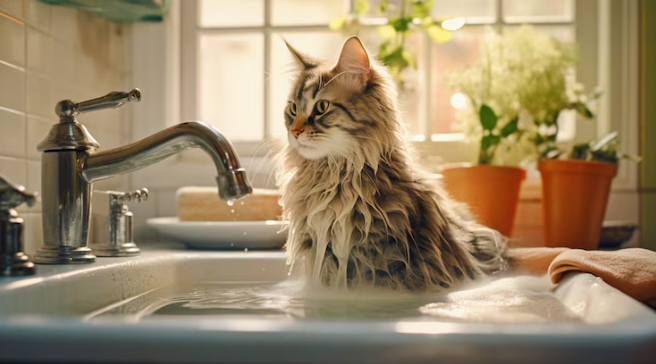
Dawn is packed with cleaning agents meant for hard surfaces, but cat skin is biologically different, thinner, and far more sensitive.
● Sodium Lauryl Sulfate (SLS): On cats, it pulls away natural oils that protect the skin barrier. Over time, this can lead to:
○ Dryness
○ Flaking
○ Irritation
○ Increased vulnerability to infections
● Sodium Laureth Sulfate (SLES): Similar to SLS but slightly milder. Still, it disrupts lipid layers in the skin. On a cat, this may trigger itching or inflammation, especially if applied repeatedly or not rinsed thoroughly.
● Fragrance and dyes don’t help with cleaning—they’re added to make the product smell and look nice for us. But for cats, that’s a problem. Since they lick their fur constantly, any leftover scent or coloring can end up in their system, introducing chemicals their bodies aren’t meant to process.
● Alcohol-based solvents break down tough grime effectively, but they’re rough on skin that’s already sensitive. For older cats or those with allergies, these solvents can dry out the outer skin layer fast, making things worse instead of better.
Here’s how to assess the situation.
There are limited, specific cases where Dawn may be appropriate under controlled conditions:
In emergency cases where commercial flea treatments aren’t available, Dawn may help temporarily remove adult fleas by disrupting their waxy exoskeleton. This only works on live fleas, not eggs or larvae.
Best practices:
● Use one-time only, not as a routine treatment
● Rinse thoroughly to prevent residue buildup
● Follow with a vet-approved flea control plan
If a cat gets into motor oil, paint, or other toxic substances, Dawn can help remove contaminants quickly and thoroughly. In these urgent scenarios, the priority is to clear hazardous materials, not preserve skin oils.
Best practices:
● Use lukewarm water and dilute Dawn
● Minimize scrubbing to avoid abrasions
● Contact a vet immediately after cleaning
If it’s not an emergency, skip the Dawn. It’s not built for regular grooming, and here’s what that really means.
● Routine bathing: Cats already do a solid job of keeping themselves clean. Using Dawn strips away the natural oils they depend on to keep their skin balanced. Do it enough times, and you could see irritation, flakiness, or even allergic flare-ups.
● Kittens and seniors: Younger and older cats both have delicate skin that doesn’t bounce back the same way. Their systems are also more reactive. Ingredients in Dawn, like preservatives or added fragrance, can easily set off skin trouble.
● Existing skin issues: If your cat has scabs, fungal spots, or known skin conditions, using something that lathers aggressively, like Dawn, can make things worse. Instead of helping, it can drag out healing and increase discomfort.
● Using it in place of medicated shampoo: Dawn doesn’t contain anything that targets infection, calms inflammation, or supports recovery. Replacing a prescribed shampoo with dish soap slows down treatment and can complicate the issue.
Bottom line? Dawn might be a fix in a pinch, but it’s not made for day-to-day cat care.
Most cats don’t need full-body baths often. They groom themselves constantly, and their coats are naturally low-maintenance—until something disrupts that rhythm. When cleaning is necessary, the goal is to support their skin’s integrity, not strip it down.
That means using products made for cats, not for dishes.
● Use Cat-Specific Shampoos: If your cat has a skin issue, don’t guess. Only use medicated shampoos your vet recommends, and follow their directions closely. Using the wrong product can make things worse, not better.
● Focus on Spot Cleaning: For most messes, a full bath isn’t needed. Instead, target specific areas:
○ Use a damp microfiber cloth for sticky patches
○ Apply pet-safe grooming wipes for paws, tails, and faces
○ Dry clean with pet brushes to remove excess fur and dander
A clean, soft coat doesn’t start in the tub. It starts in the water bowl. When cats don’t drink enough, their skin dries out. That leads to flaking, itching, and more hair left on your furniture than on their body. But getting a cat to drink more? That’s a challenge on its own. Most cats ignore stagnant water, even if it’s fresh.
That’s where something like the WOpet water fountain makes a real difference. The gentle flow keeps water moving, filters out junk like hair and dust, and makes drinking feel natural, not forced. No weird noises. No weird smells. Just clean, flowing water that cats actually want to sip.
It’s simple, low-effort, and works quietly in the background. While you go about your day, it’s helping your cat stay hydrated, which supports kidney health, digestion, and yes, fur that’s easier to manage and way less prone to shedding all over your couch. Healthy skin doesn’t need a reset every month. It needs small, smart choices that work every day. This is one of them.
Reaching for Dawn might feel like a quick fix, but when it comes to cat care, quick doesn't always mean safe. You’ve seen how the ingredients in Dawn work, how they react with feline skin, and where the line gets drawn between emergency use and overuse. That kind of clarity matters when your goal is to keep your cat healthy, not just clean.
Now you know when Dawn might be useful in rare situations, and more importantly, when it should be kept under the sink. You’ve learned what alternatives actually support your cat’s skin health, how spot cleaning reduces stress, and how hydration tools like WOpet’s water fountain play a bigger role in coat care than most people realize.
Smart pet care doesn’t start with a bottle of soap—it starts with understanding your cat’s biology, environment, and daily needs. The less you react, the more you prevent. And when you rely on tools built to support your pet’s routine from every angle, clean becomes effortless—and safe. WOpet’s pet-first tech is built for those everyday moments that matter most.
Label:
Popular Post

What to Feed a Sick Dog With No Appetite? [2025 Guide]
May 16, 2023
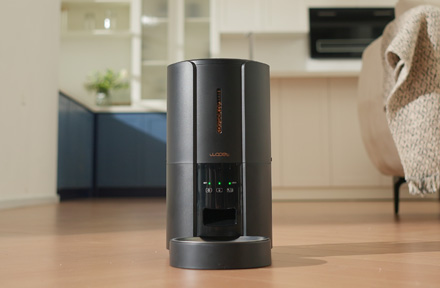
Troubleshooting Common Issues with Automatic Pet Feeders: Tips & Tricks for Pet Owners
Oct 26, 2023

Why Does My Cat Cough After Drinking Water? 8 Potential Reasons
Mar 13, 2023
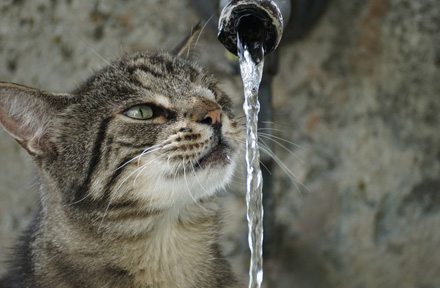
Why is My Cat Throwing up Water? Top 5 Causes Here
Feb 08, 2023
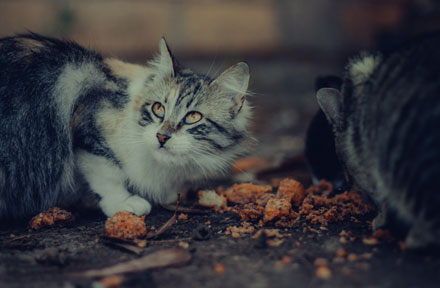
My Cat Only Eats A Little at A Time - What to Do?
Feb 27, 2023
$99.99
$129.99
Copyright © 2025 WOPET. All Rights Reserved.